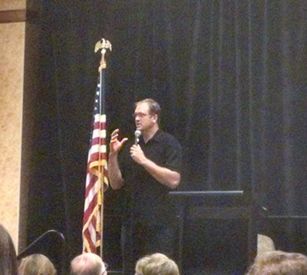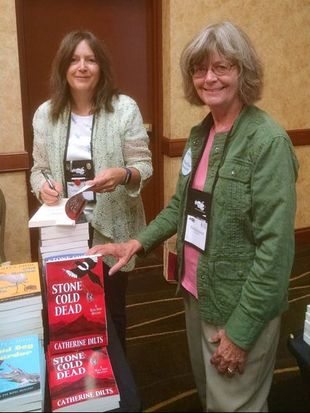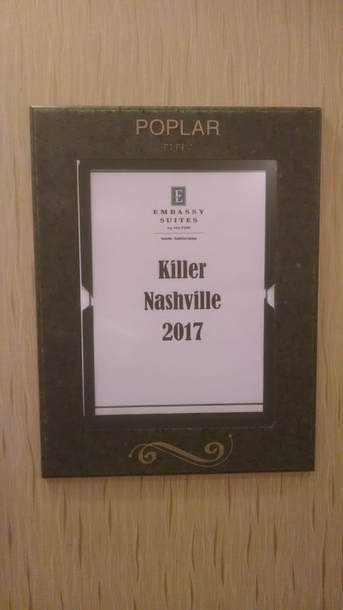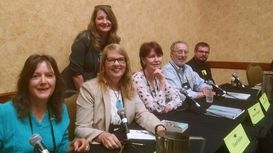|
8/29/2017 0 Comments Killer Nashville: Morning, Day One Road Trip! Writers often choose which conferences to attend based on whether they have seen the city where the event is located, hoping to combine sightseeing with business. I had never been to Killer Nashville. My husband has never accompanied me to a writers’ conference. He decided it would be fun for us to drive from Colorado to Nashville. Kind of a last chance to have a vacation before he starts a new job. During the drive from Colorado to Tennessee, we gawked at the sights, dreaming of the day when we retire, and can do a trip like this at a leisurely pace. It was a two-day drive, and we stopped outside Kansas City for the night. We rolled into the conference hotel Thursday night, too late to take part in the Southeast Mystery Writers of America Ready Set Pitch. I did wander by the Sisters in Crime gathering in the bar, offering travel-glazed greetings before crashing for the night.  Steven James Steven James Friday morning, we went to the free breakfast buffet in the venue hotel, the Embassy Suites. This was no ordinary hotel breakfast of bagels, coffee, and warmed-over eggs. A cook dazzled with made-to-order omelets. Bowls of fresh fruit and a slow-cooker of oatmeal offered healthy options. 8:00 Friday August 25 – Opening Keynote Speech - Throw Your Hat Over the Wall Steven James delivered a motivational speech. He read rejection letters, which is always entertaining and encouraging for writers. We’ve all received the letters he described. His record-breaker rejection letter came seven years and four months after his submission. The speech set the right tone for me. It’s easy to get caught up in reaching for the next goal, rather than celebrating where I am right now. James advised that writers be satisfied with our quiet accomplishments. The title of his talk referred to reaching what seems to be an insurmountable obstacle. The advice is to throw your hat over the wall. Then you have no choice but to find your way over the wall. In a startling bit of advice, he suggested most of the audience is writing too much. Write 300 words a day, he suggested, for 300 days a year. At the end, you will have a 90,000 word manuscript. Best quotes: Be satisfied with quiet accomplishments. Don’t compare yourself to someone else. You were made for a reason. You were made to soar.  Catherine Dilts and Mary Davidsaver in the Killer Nashville book store Catherine Dilts and Mary Davidsaver in the Killer Nashville book store I hadn’t attended a conference in over a year, but it didn’t take long for me to get back into conference mode. I was happy to see authors I knew, and to meet new folks. Killer Nashville generously placed me on several panels. I was also given slots for book signing in the conference bookstore. Here’s a bit of advice, and don’t just take it from me. My publisher sent plenty of book one and two in my series. They didn’t send book one, and that’s the book people wanted. Happily, I had brought copies of Stone Cold Dead, which sold better than I expected. I heard from other authors who had experienced arriving at book signings elsewhere only to learn the book store had not acquired any copies of the book to be signed. Their advice, and mine, is to always bring copies of your book, just in case.  8:40 Friday August 25 – Panel – Creating and Weaving Subplots Kelly Oliver – moderator; Paula Benson, Mary Davidsaver, Susan Page Davis, Tracee de Hahn, Rick Helms After delivering books to the conference bookstore, I attended a panel on subplots. Authors discussed how they create and use subplots in their fiction. Here are selected quotes: Paula Benson – Secondary characters can bring out the background of, and add complications to, the main character’s plotline. Rick Helms – In a techno-thriller, a subplot showing the affect of the main plot on people can add a humanizing element, and draw readers in. Susan Page Davis described how she used subplots in the conclusion of a series to lead to the main mystery. Mary Davidsaver does not plan out the subplots. She is a pantser – a seat-of-your-pants writer, and found NaNoWriMo useful to complete her novel. Tracee de Hahn also described herself as a pantser, and said her subplots come out as she writes. She agreed with Rick that subplots draw readers in. She has a character that never appears in her novels, and yet the subplot of this minor character seems to resonate with readers. Kelly Oliver believes writers can create powerful moments in a novel when the subplots and the main plot connect.  Panel: Time Management Panel: Time Management 9:40 Friday August 25 – Panel – You Don’t Have Time NOT to Write: Time Management for Authors Dana Chamblee Carpenter – moderator; Andy Davidson, Catherine Dilts, Cheryl Hollon, Bruce Meisterman, Maureen Sappey On this panel, we offered encouragement to writers with busy lives, and strategies for time management. I was a panelist, and did not take notes, so I’ll try to summarize the main points. After introductions, giving our writing credentials and describing our time constraints, Dana asked what kinds of barriers we use to protect our writing time. I described how I get up between 5 – 5:30 am and write before I go to work. I also use noise-cancelling headphones and the free internet radio service Pandora to block out household noises. Other authors on the panel were able to establish their own writing space in their homes. One panelist converted her husband’s no-longer-used backyard wood working shop into her writing office. Panelists suggested setting habits and routines for writing. For those with day jobs, there are moments of “found time” in a day. Writing over the lunch break, or editing when there is downtime, can squeeze a few extra minutes of creative time into a day. Dana asked what sacrifices panelists make to fit in writing time. All agreed that television viewing was dramatically curtailed. Socializing, chatty phone calls, and time on social media were also sacrificed to make more time for writing. One panelist gave up time he spent participating in sports for writing. When it came to the specifics of time management, panelists had different methods for ensuring how their time was spent. I use an Excel spreadsheet to track my hours, while others set daily word counts. Whatever the approach, all agreed that to write, sacrifices have to be made, and schedules have to be set. My first day at Killer Nashville began with inspiration, instruction, and meeting fellow writers. I’ll continue next week with Friday afternoon, and a Killer short story panel.
0 Comments
Your comment will be posted after it is approved.
Leave a Reply. |
Subscribe to this blog: |
Proudly powered by Weebly
 RSS Feed
RSS Feed